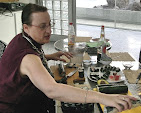I am half cross posting this from a discussion on the Medieval and Renaissance cooking and recipes group on Fbook, partly so I will remember to actually give it a try soon. Someone asked about medieval crackers, which turned into a discussion about bread, which turned into a discussion on toast and whether toasted bread would have been served to an English lord in the Saxon period.
This discussion got me hunting and I found a recipe for "A grilled cake with chicken filling". This provided me with a lovely opportunity for my favourite hobbyhorse... critical thinking and questioning assumptions.
So let me share the story with you as it happened, because well, I just found the whole discussion fascinating and exciting.
The recipe is from Manuscript W (1213 - from the Herzog August Biobliothek of Wolfenbuttel, Germany) of the collection of manuscripts dubbed by Grewe and Hiatt as the Libellus de arte coquinaria (from the 2001 publicationof the book).
The recipe is for making a thin dough of eggs and flour, frying it and topping
it with chicken. Pretty straight forward eh?
So here is my conversation on it:
Me: The original text says "Item, nym eigere unde mel;
werke daraff eynen dunnen dech. Sette dat uppe eyn iseren unde sla
eigere myt mele unde gutdarin". The translation offered by Grewe and
Hieatt is "Next, take eggs and flour. Make it into a thin dough: onto a
gridiron pour [the] eggs beaten with flour".
I don't have a word of
medieval Low German vocabulary, but I would love to have clarification
on the translation of the word 'pour' and whether it could be translated
in a different slant, if you think of the dough as being less of a
pancake dough and more like a bread dough.... anyone out there have Low
German?
Response: sounds like a crepe.
Me: It
does indeed, if you pour.. but if you think of the words 'thin dough'
as being less a batter and more along the lines of thinly rolled dough
(for example pasta dough is just flour and eggs), you can see why the
word translated as 'pour' makes such a difference. Is the word 'pour'
or is it 'set it' or 'place it' or 'put it', and the context of thinking
of it as a batter made the translator translate it as pour? Looking at
the original text, I think maybe the word 'Sette' is the relevant word,
and the online low medieval German dictionary I found translates that
as 'setzen', which is modern German for 'set'. Which gives the
possibility of it being a much thicker dough. See what I mean?
Response (from someone is a native German speaker): Kiriel you are very likely right that "sette" is to set it upon the irons, Like waffles.
Me: Thanks.
See now this is one of the things that excites me about medieval
cookery! We may well be the first people in 800 years to look at
this recipe and see the possibility that it could be cooked this
particular and different way. How we experience our own lives affects
our vision of these recipes. Someone from say America might see a
recipe for something that uses a wafer iron and interpret the content as
being a batter, where someone from Belgium might interpret it as a
dough (as waffles in Belgium are made from a yeast dough). The key is
to try and see all the possibilities and make choices knowingly. Sorry,
I am waffling on (pun intended), but I really do get excited by this
stuff!
Response: Belgian waffles are risen with yeast, but are still poured
Me: Not
in Brussels they aren't - at the street stalls making them they have
balls of dough, and you watch them grab a ball and put it on the iron.
Definitely NOT poured.
Response: Hmmm.. If
lets say they don't pour the dough and are using a thin dough- and
rolled it thin, or spread it thin, or griddled it- it would be a
cracker!
Me: Not
necessarily but quite possibly - we should properly check the translation, and you will
have to try and cook it and see what comes out - but certainly it looks
like the possibility is there! See, isn't that exciting?
The next step will be, of course, to try making variations and see what we get. Watch this space for more on that front soon! I would love to hear from you if you have had a go at this recipe, or if you want to join me in some experimentation.
Monday, February 17, 2014
Subscribe to:
Comments (Atom)

